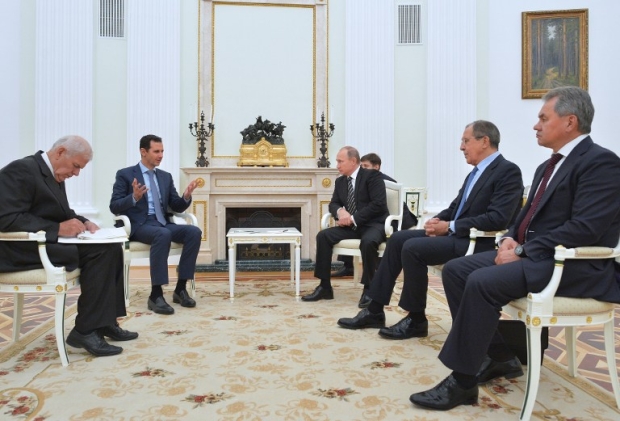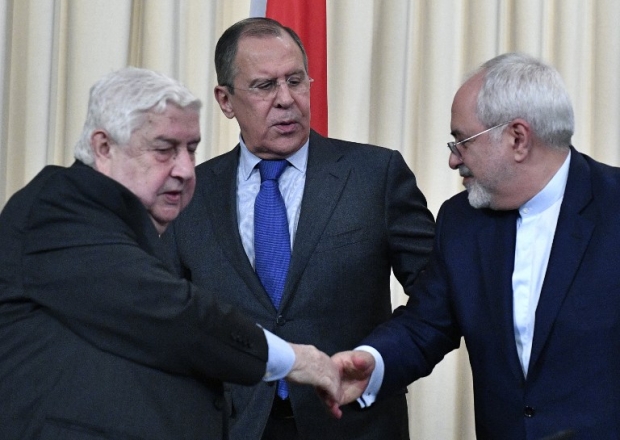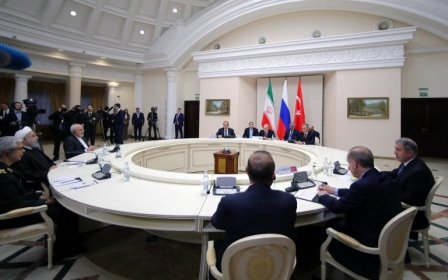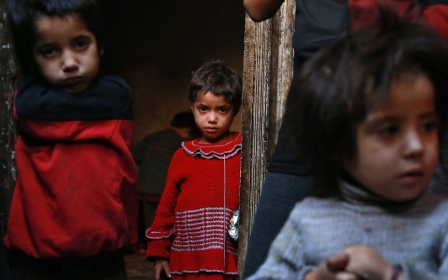Could Putin be an honest broker in post-war Syria?
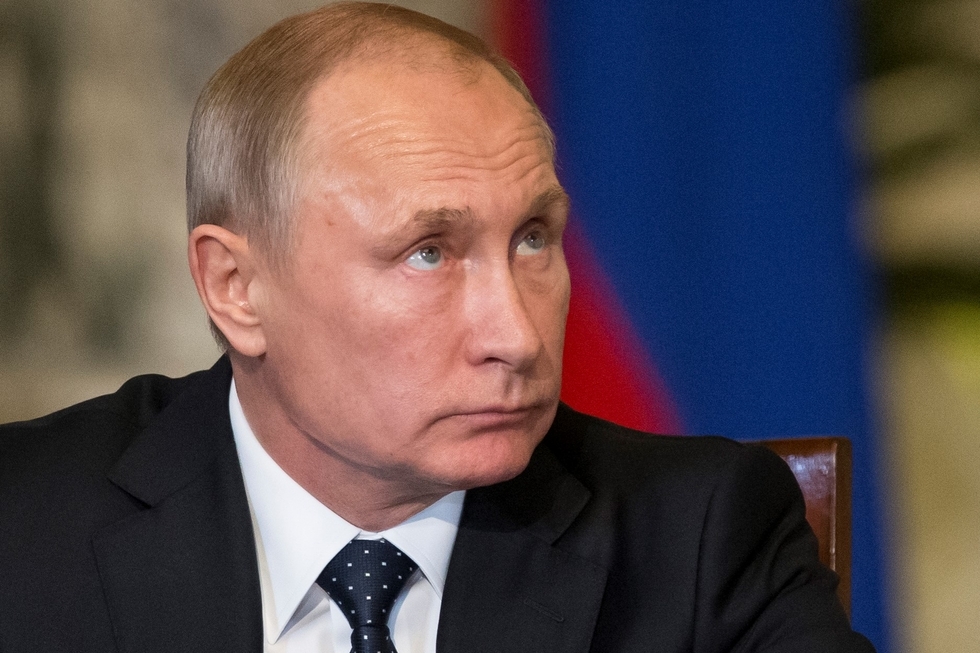
On Monday, Russian President Vladimir Putin made a surprise visit to Khmeimim air base in Syria's Latakia province and ordered the start of the withdrawal of Russian troops from the country. Putin's announcement comes a few days after the head of Russia's national security council, Nikolai Patrushev, said that Russia has started preparations to downsize its military presence in Syria.
While Patrushev did not provide a timetable for the pull-out at the time, Putin's visit and statements put an end to weeks of speculations.
After six years of civil war in Syria, it seems that the military stage of the conflict is coming to an end. However, it ushers in a new phase in which all parties of the conflict will be forced to discuss the most sensitive issues of post-war Syria including reconstruction, political reforms, spheres of influence, etc.
In such a context, Russia, being one of the major players on the ground, is likely to face a host of new challenges.
Mission accomplished?
Over the course of 2017 Russia announced a gradual end to the military stage of the Syrian conflict several times. In February, Defence Minister Sergey Shoigu said - for the first time since Russian military involvement in Syria began in September 2015- that Russian troops would be coming home soon.
Later in March, Putin announced that the main goals in Syria were completed and ordered a partial withdrawal of troops, although the military campaign continued.
In late August, Shoigu stated the war in Syria had reached a "de facto" end. Putin echoed similar statements during a meeting with Turkish President Recep Tayyip Erdogan in September, confirming that "conditions for peace have been created in Syria".
Over the past few weeks, the Russian defence minister claimed that 95 percent of the Syrian territory was freed from the Islamic State group (IS). Discussions about the end of the military phase in Syria dominated talks between Putin and Assad as well as the trilateral Syria summit held in Sochi last month.
These were clear indications that Moscow viewed the situation in Syria as favourable to Russian interests and that it intends to concentrate now more on the political track of the conflict while keeping an upper hand.
An effective military campaign
It is quite obvious that Russia's decision to deploy its military to Syria in 2015 played a key role in changing the tide of war in favour of the Syrian government forces. Back then, according to the Russian defence ministry, the Syrian army was "weeks from defeat".
If we were to accept that the major goal of Russia's military campaign in Syria was to defeat terrorists and save the Syrian state from collapse – it indeed came very close to achieving that goal.
According to Russian defence ministry statistics, released last September, in two years its air force made 30,650 sorties, launched 92,006 air strikes and hit 96,828 terrorist targets, including 8,330 command points, 53,700 groups of militants, 212 oil fields and 84 oil refineries and oil depots.
The Russian military took part in major battles including recapturing Palmyra, Aleppo and Deir Ezzor and provided air support for the Syrian army that greatly contributed to its survival and success.
Moreover, Moscow was assigned the Khmeimim air base near Latakia and started to upgrade its naval facility in Tartus, with the aim of it becoming a military base. Although the number of the Russian military in Syria has never been revealed, some estimates suggest that by the end of 2015 there were about 8,000 military personnel in the country.
This number might be even higher if we were to consider private military companies operating in Syria such as "Vagner". In the course of two years, Russian official sources confirmed the death of 41 military personnel in Syria. The real numbers might well be higher, especially if we were to include private military contractors' losses.
However, from a military perspective, Russia's Syria campaign looks very effective considering the ratio of losses to the participating personnel.
To have an upper hand in the political process Moscow can't simply withdraw from Syria and lose its leverage
However, it does not mean that after military defeat of "terrorists" in Syria, Moscow will just retreat or will be completely satisfied with the results. Firstly, the Russian official line is that Russia is there to stay (although on a reduced scale) to maintain its positions, to prevent any recurrence of terrorism and sectarianism and to make sure that its interests in the region are taken into account.
Secondly, the end of the military stage of the Syrian crisis exposes a whole set of other challenges, mostly political, that Russia will have to confront.
These include Syria's post-war reconstruction, its political and constitutional reforms, the role of the Kurds in a future political order, the fate of Bashar al-Assad, Iran's growing presence and influence in Syria, Israel's security concerns, Jordan and the US, etc.
To have an upper hand in the political process Moscow can't simply withdraw from Syria and lose its leverage.
A tricky situation
Russia, which strives to position itself as a major power-broker in Syria by opening up to key actors in the Middle East, is getting to the point where it will be more difficult to maintain such a role.
Given different and even conflicting interests and goals of other powers involved – Iran, Turkey, Israel, Saudi Arabia, Qatar, and the US – Moscow will be in a tight spot trying to maintain the status quo without being perceived as a dishonest partner that favours one party over the other.
This is especially true with regards to Iran, which also supports the Syrian government and opposes US influence in the region.
In the past few months Russian diplomacy has demonstrated quite vividly Moscow's commitment to be flexible and maintain ties with all stakeholders in the Syrian crisis and to understand their concerns.
Over the past two months, Putin has visited Turkey and Iran. Saudi Arabia's King Salman made a historic visit to Moscow. Erdogan visited Russia and then returned on 22 November for the trilateral Russia-Turkey-Iran summit on Syria in Sochi.
After meeting with Assad, Putin briefed the leaders of Qatar, the US, Saudi Arabia, Israel and Egypt.
Basically, Russia wants to demonstrate that it is trying to consider the security concerns of the US, Saudi Arabia, Jordan and Israel. All want to curb Iranian influence in the region.
However, at the same time Moscow does not want to disappoint Tehran. Both countries already do not see eye to eye on a number of key issues, including the fate of Assad, post-war political reforms, the role of the Kurds, cooperation with the US, the level of post-war military presence and influence in the country, etc.
Therefore, this development puts Russia in a rather tricky situation.
A double game
As a result, Moscow tries to play a double game. On the one hand, it wants to appease the US, Israel and Saudi Arabia by showing its readiness to cooperate on all major security issues in the region and to settle the Syrian crisis by political means.
On the other hand, it does not want to alienate Iran as it is an important player on the ground in Syria. Sooner or later Moscow needs to make a choice.
All this creates quite a challenging environment for Moscow where it would be harder to operate, especially when it comes to Tehran. For the Syrian government, Iran is an important backer that provides not only military but also economic, financial and humanitarian aid.
Iran might easily play a role of the spoiler for Moscow because building up better relations with the US and its allies will automatically lead to more tensions between Russia and Iran
For Turkey, Iran is becoming more and more important especially in light of the Kurdish question and dealings in Iraq and Syria. For Israel, Saudi Arabia and the US, Tehran is a major enemy in the region and its growing influence in the Middle East is among major security concerns for all three.
It will require from Moscow a delicate manoeuvring between Iran, Turkey and GCC states with the overall desire to set up constructive cooperation with Washington. That said, Iran might easily play a role of the spoiler for Moscow because building up better relations with the US and its allies will automatically lead to more tensions between Russia and Iran.
On top of that, the end of the military stage of the Syrian war is likely to raise more tensions between Moscow and Tehran which will further complicate the political situation in Syria.
Therefore, the next phase of the Syria conflict might prove harder than the military challenge for Russia.
- Alexey Khlebnikov is a MENA expert at the Russian International Affairs Council. He holds an MA in global public policy and Middle Eastern studies. He was a Muskie fellow at the University of Minnesota Hubert Humphrey School of Public Affairs (2012-2014) and a research fellow at Johns Hopkins SAIS in 2013.
The views expressed in this article belong to the author and do not necessarily reflect the editorial policy of Middle East Eye.
Photo: Russian President Vladimir Putin looks on during a press conference with his Egyptian counterpart (unseen) following their talks at the presidential palace in the capital Cairo on 11 December 2017 (Alexander Zemlianichenko/AFP)
This article is available in French in Middle East Eye French edition.
New MEE newsletter: Jerusalem Dispatch
Sign up to get the latest insights and analysis on Israel-Palestine, alongside Turkey Unpacked and other MEE newsletters
Middle East Eye delivers independent and unrivalled coverage and analysis of the Middle East, North Africa and beyond. To learn more about republishing this content and the associated fees, please fill out this form. More about MEE can be found here.



